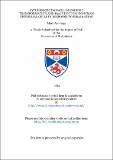Cytogenetic damage, oncogenic transformation and p53 induction in human epithelial cells in response to irradiation
Abstract
Ionizing radiation can have several different effects on cells, some are almost instantaneous such as the generation of DNA damage, other cellular responses take a matter of minutes or hours - DNA repair protein induction/activation, and others may take months or even years to be manifested - carcinogenesis. Human epithelial cell lines derived from both normal, non-neoplastic tissues and from a malignant source were cultured in order to examine several effects of ionizing radiation on such cell types. Cells not from a malignant source were previously immortalized by viral infection or by transfection with viral sequences. Simian virus 40 immortalised uroepithelial cells (SV-HUC) were found to be approximately a factor of two fold more radioresistant than cells of malignant origin (T24) in terms of unrepaired clastogenic damage i.e. assessment of micronuclei levels following irradiation. SV-HUC lines unlike T24 cells are non-tumourigenic when inoculated into nude athymic mice. SV-HUC lines proved very resistant to full oncogenic transformation using radiation and chemical carcinogens. However, morphological alterations and decreased anchorage dependant growth was observed in post carcinogen treated cells after appropriate cell culture conditions were utilized. The progression from this phenotype to a fully tumourigenic one was not recorded in this study. The ability of ionizing radiation to induce increased levels of the nuclear phosphoprotein p53 was also assessed using several different cell lines. SV- HUC and T24 cell lines failed to exhibit any increased p53 stabilization following irradiation. One cell line, a human papilloma virus transformed line (HPV) did show an approximate two fold increase of the wild type p53 protein after treatment with radiation. Only the cell line HPV showed any cell cycle delay, resulting in accumulation of cells in the G2/M compartment in post irradiation cell cycle analysis. The status of p53 was also assessed i.e. wild type or mutant conformation in all the above cells lines and two other control lines HOS (a human osteosarcoma cell line) and H Tori-3 (SV40 immortalised thyroid epithelial cells).
Type
Thesis, PhD Doctor of Philosophy
Collections
Items in the St Andrews Research Repository are protected by copyright, with all rights reserved, unless otherwise indicated.

